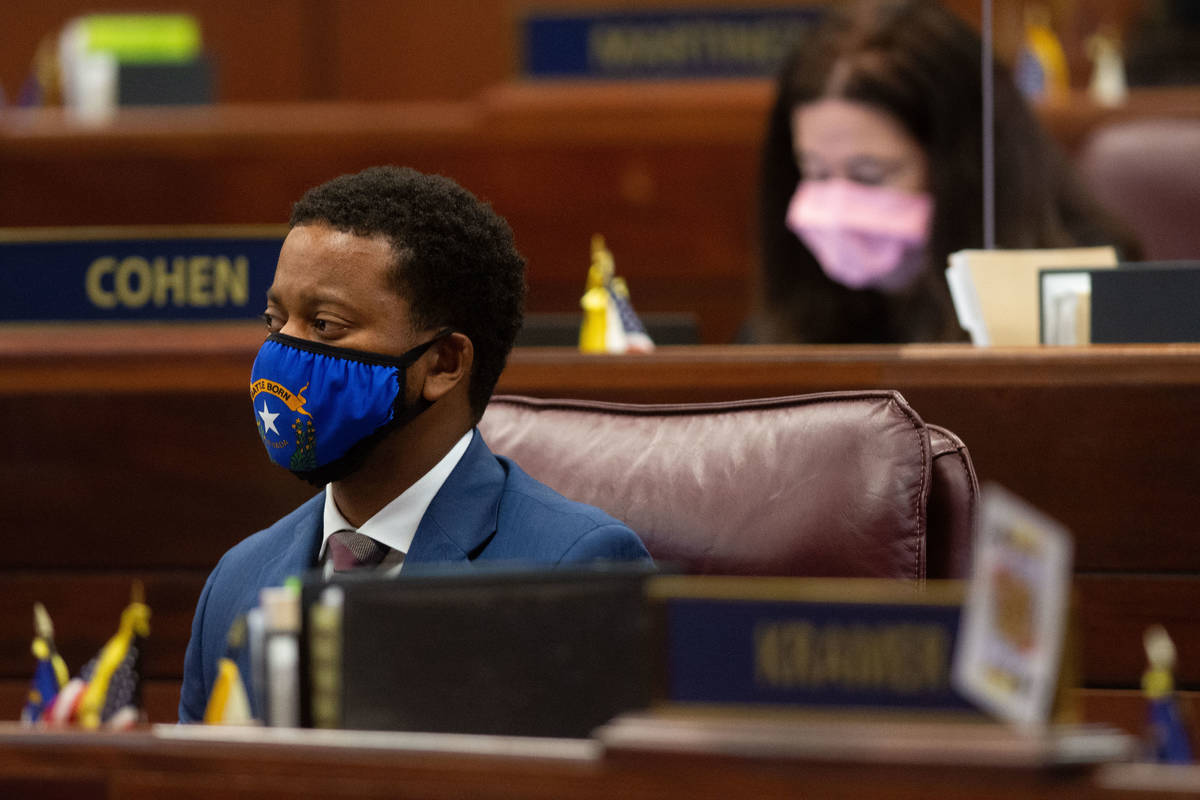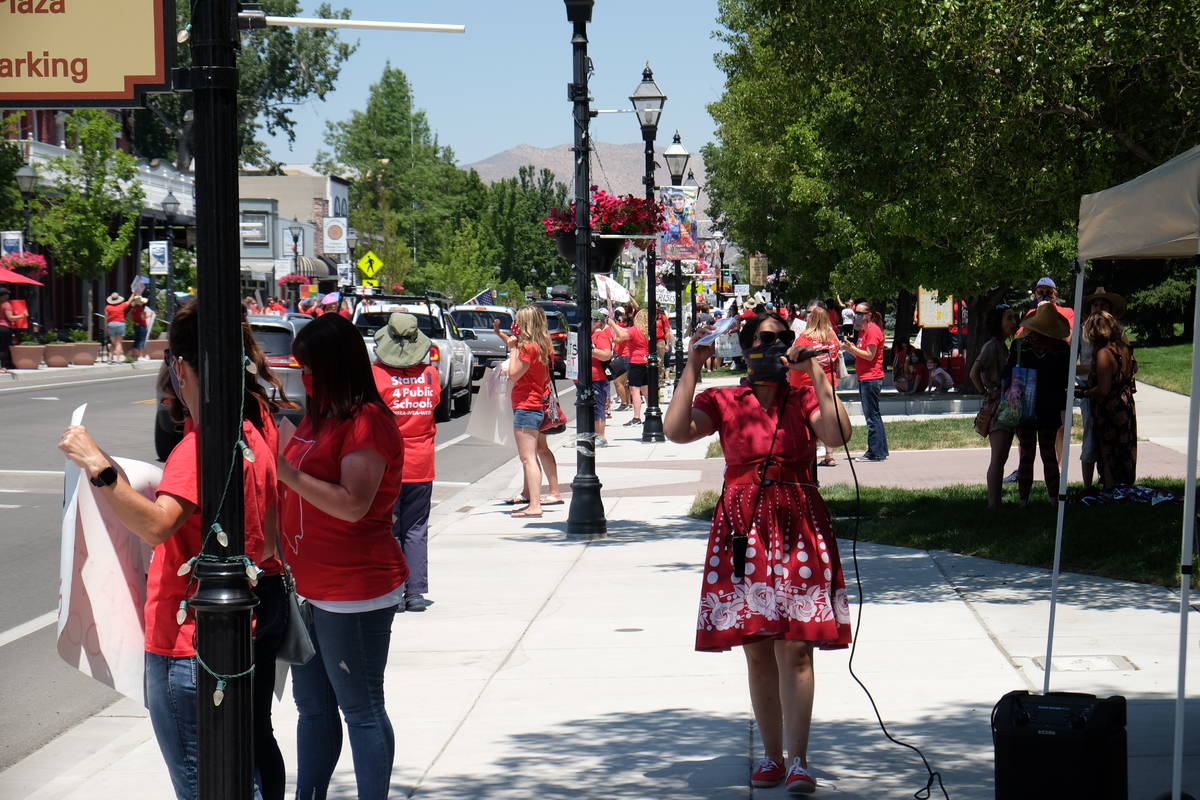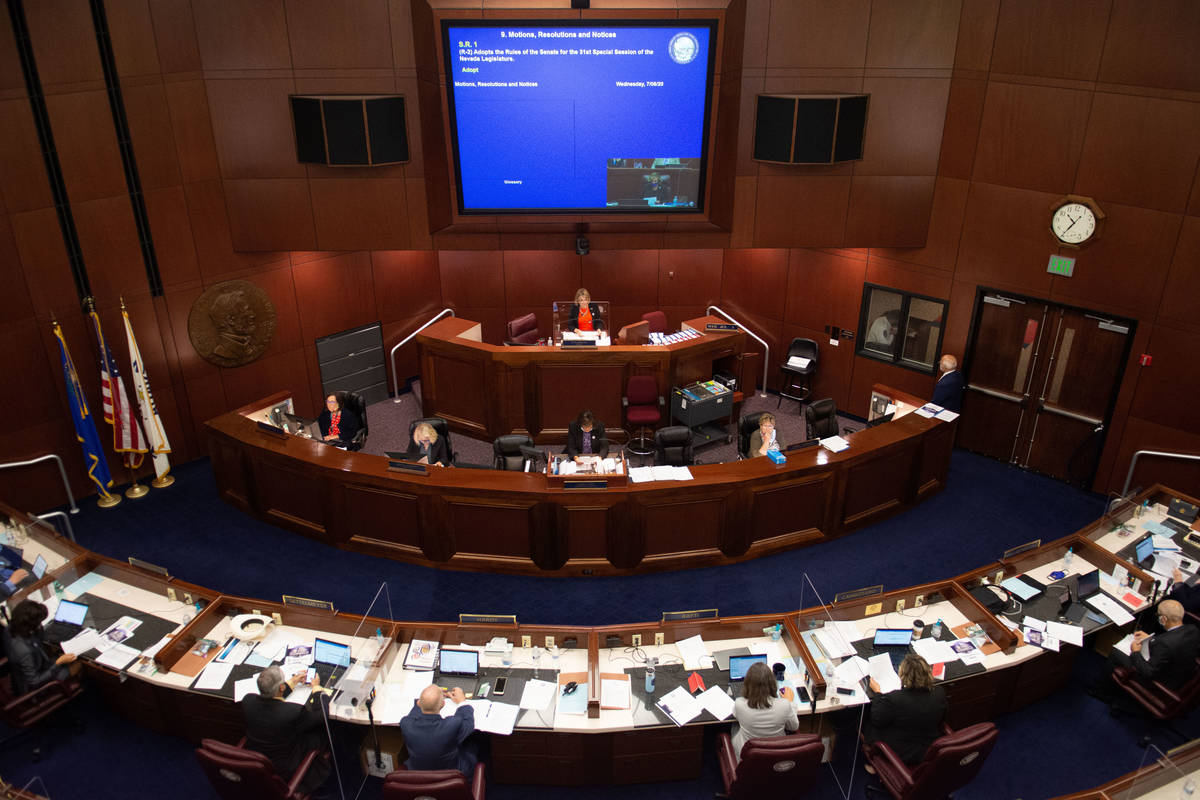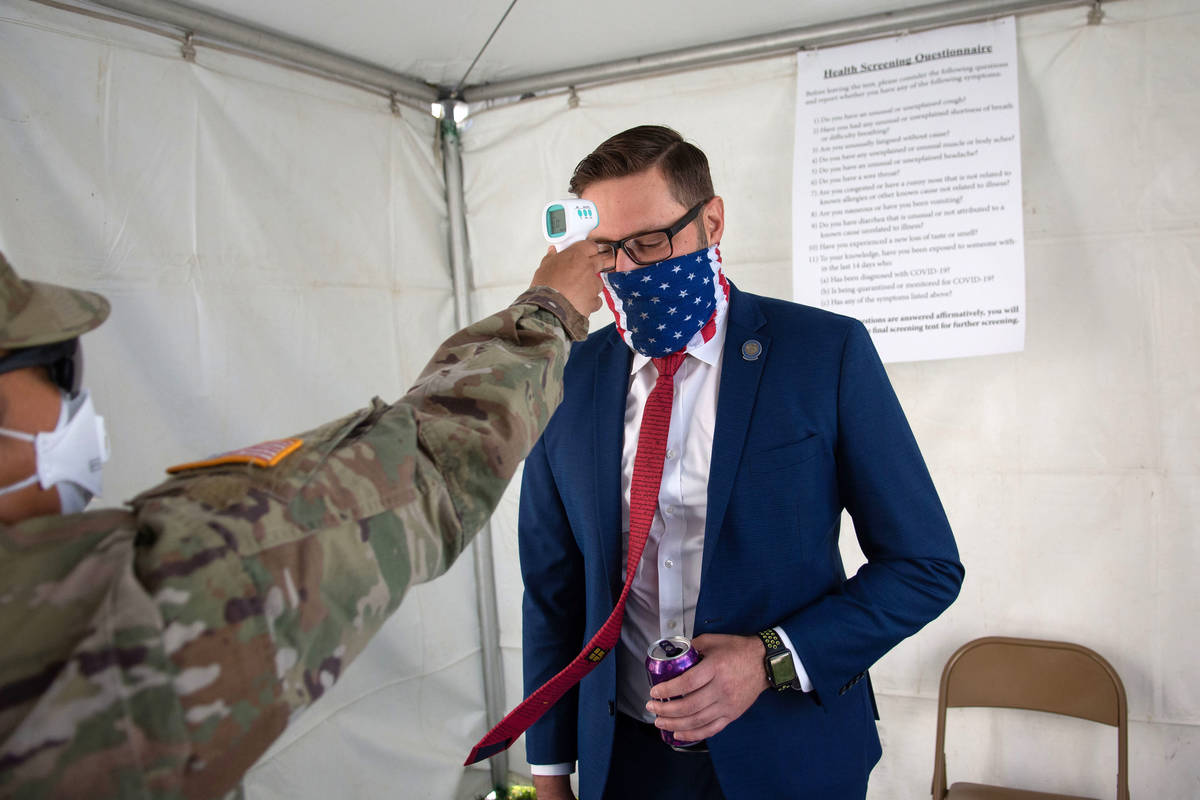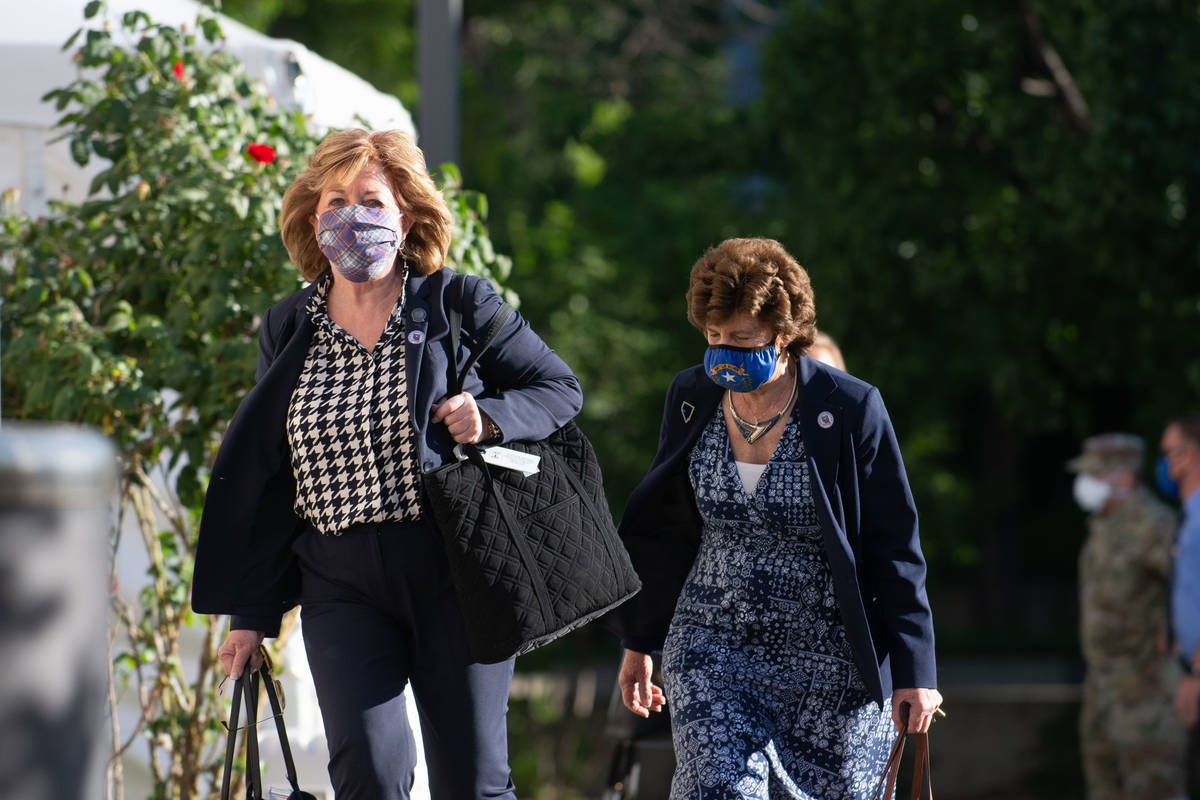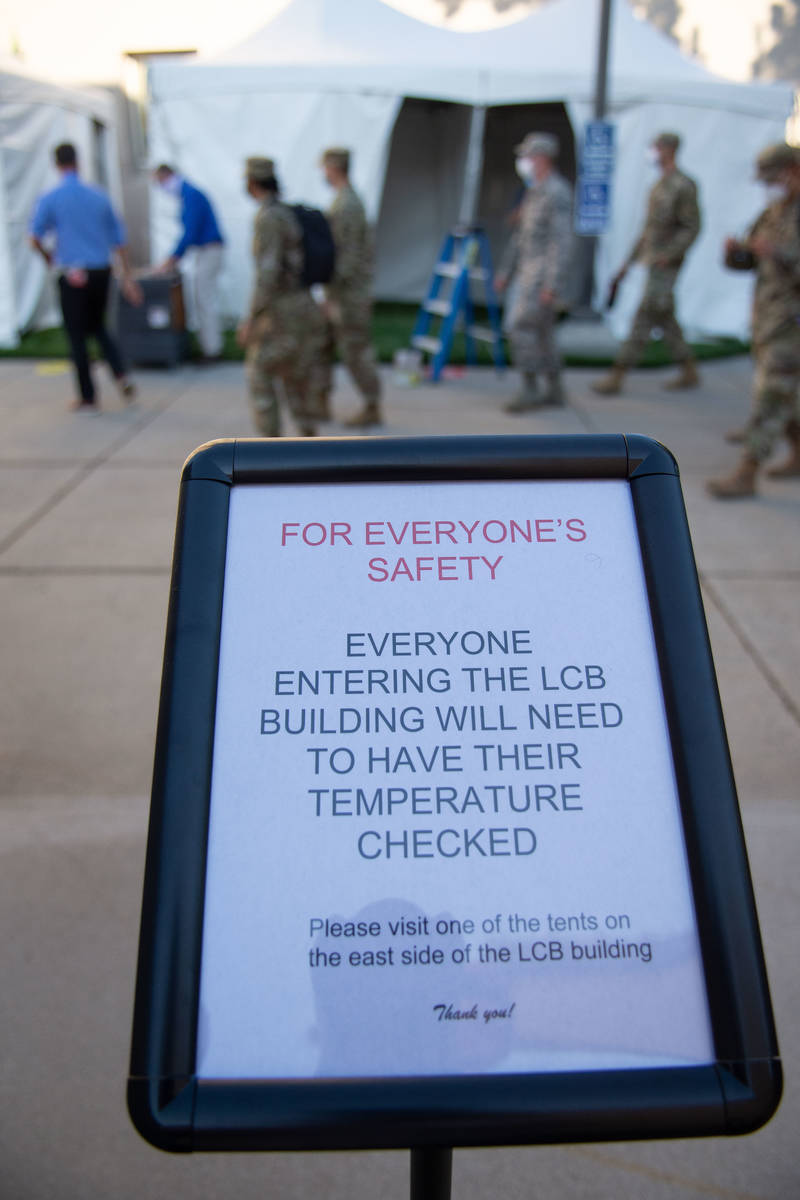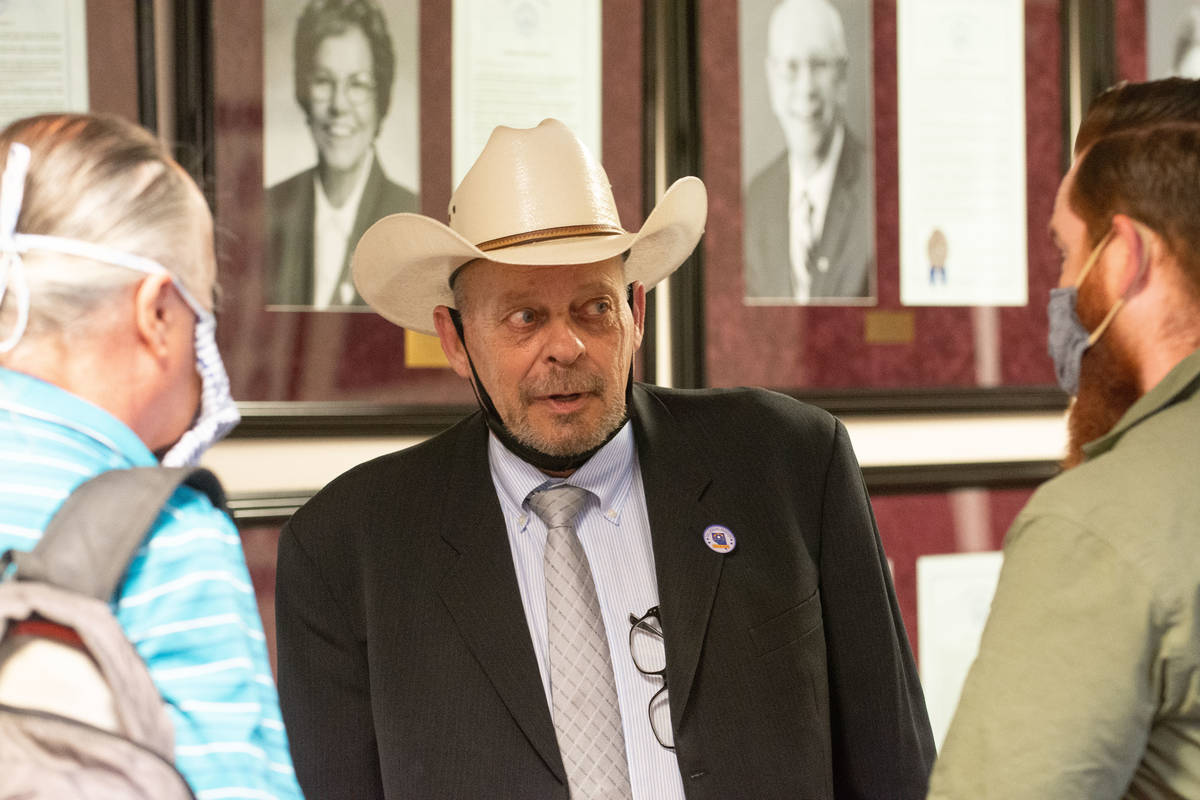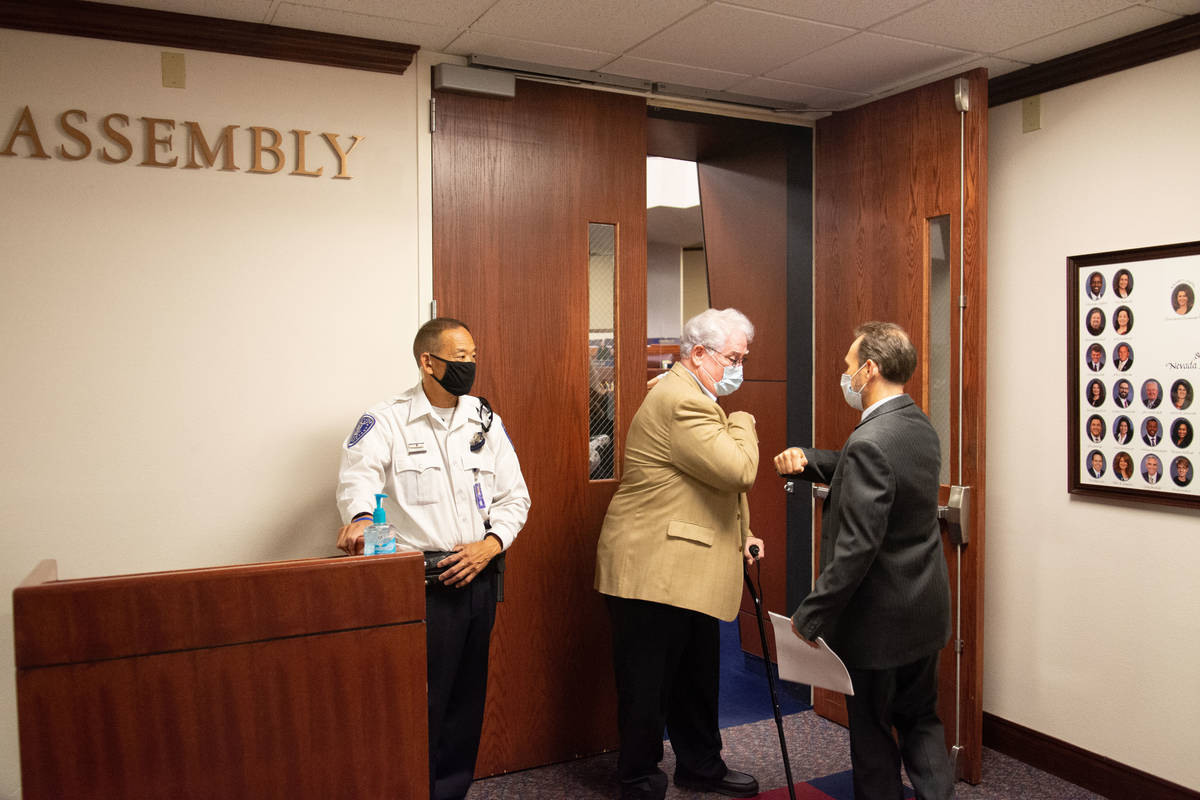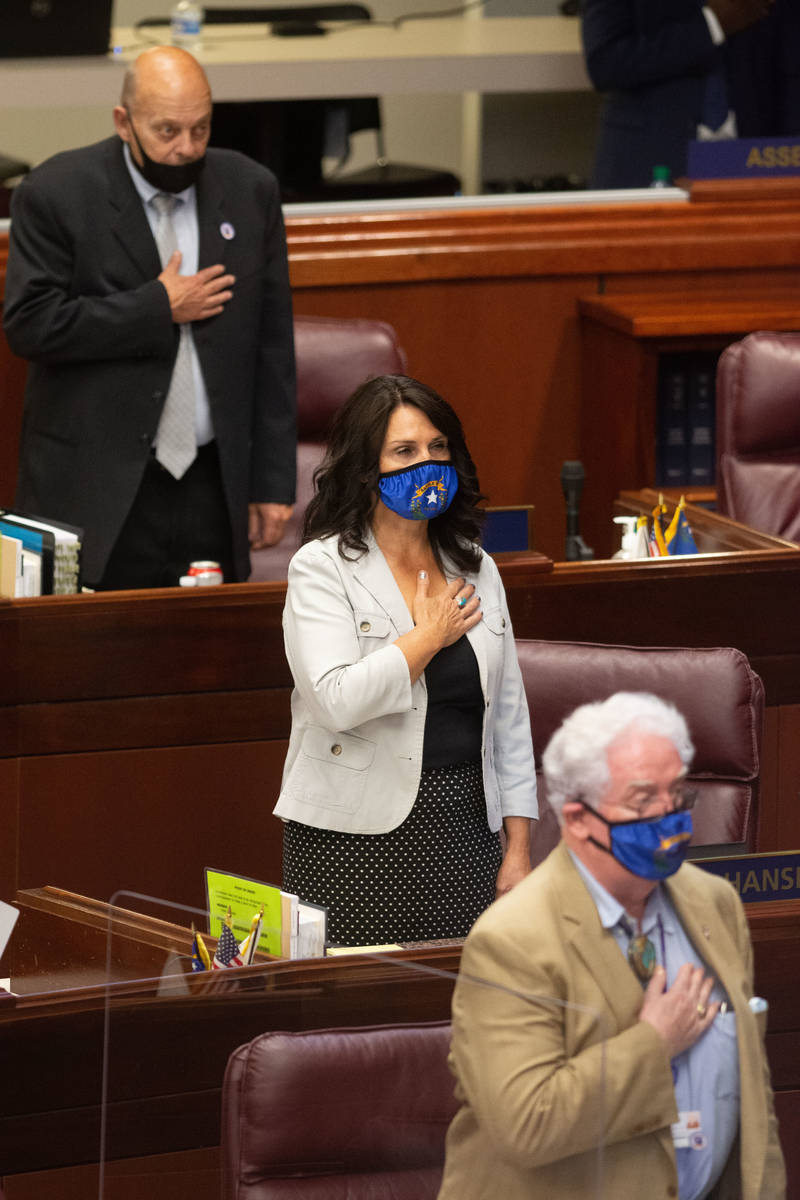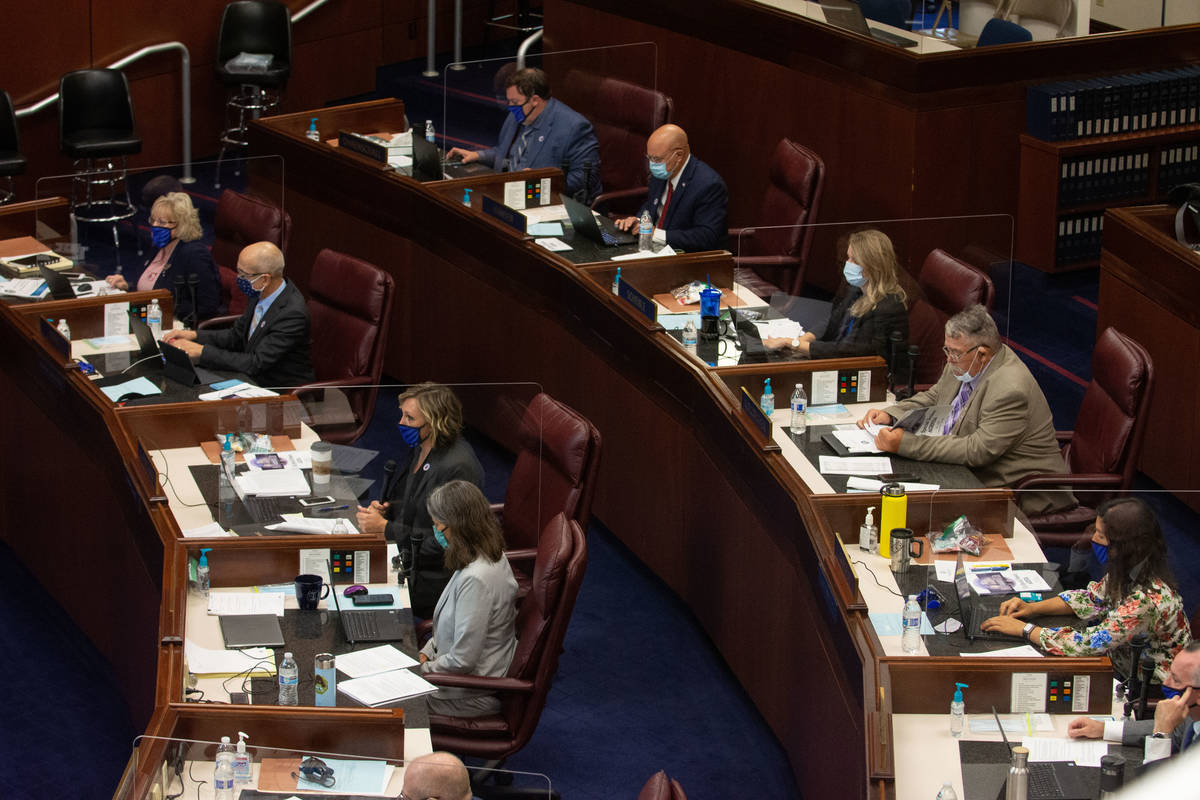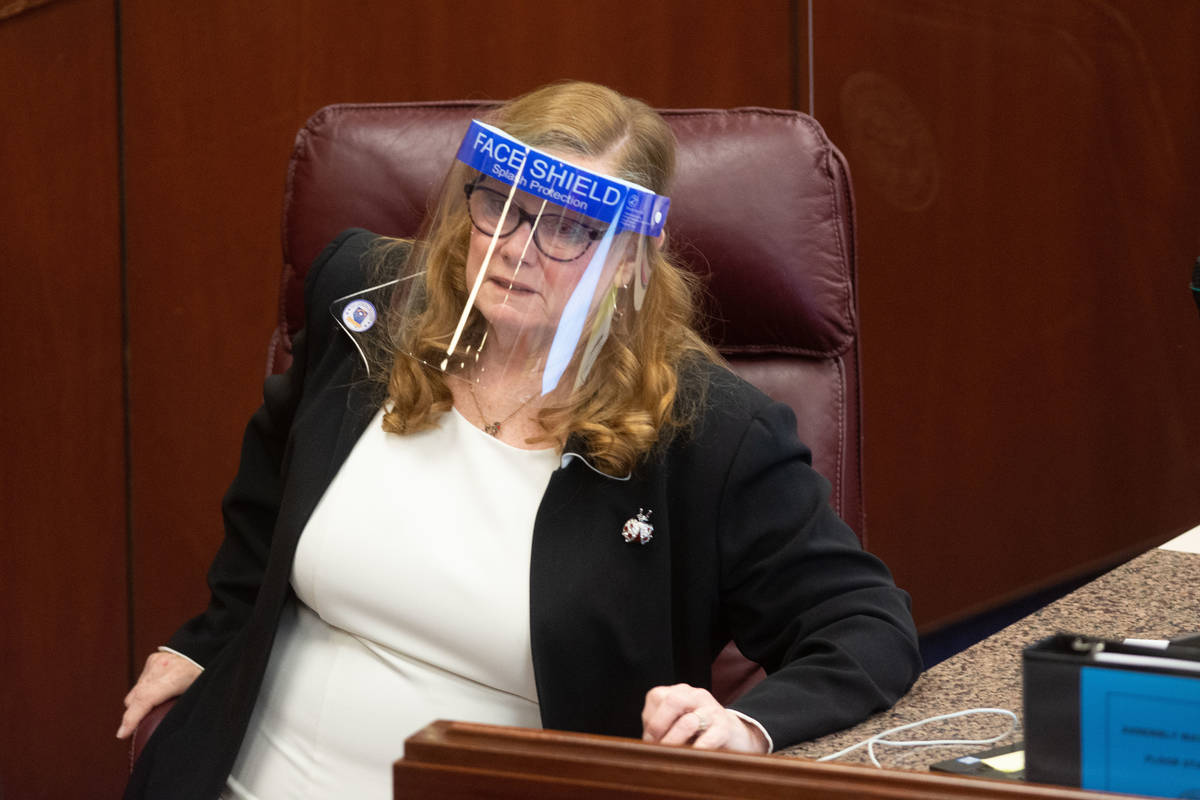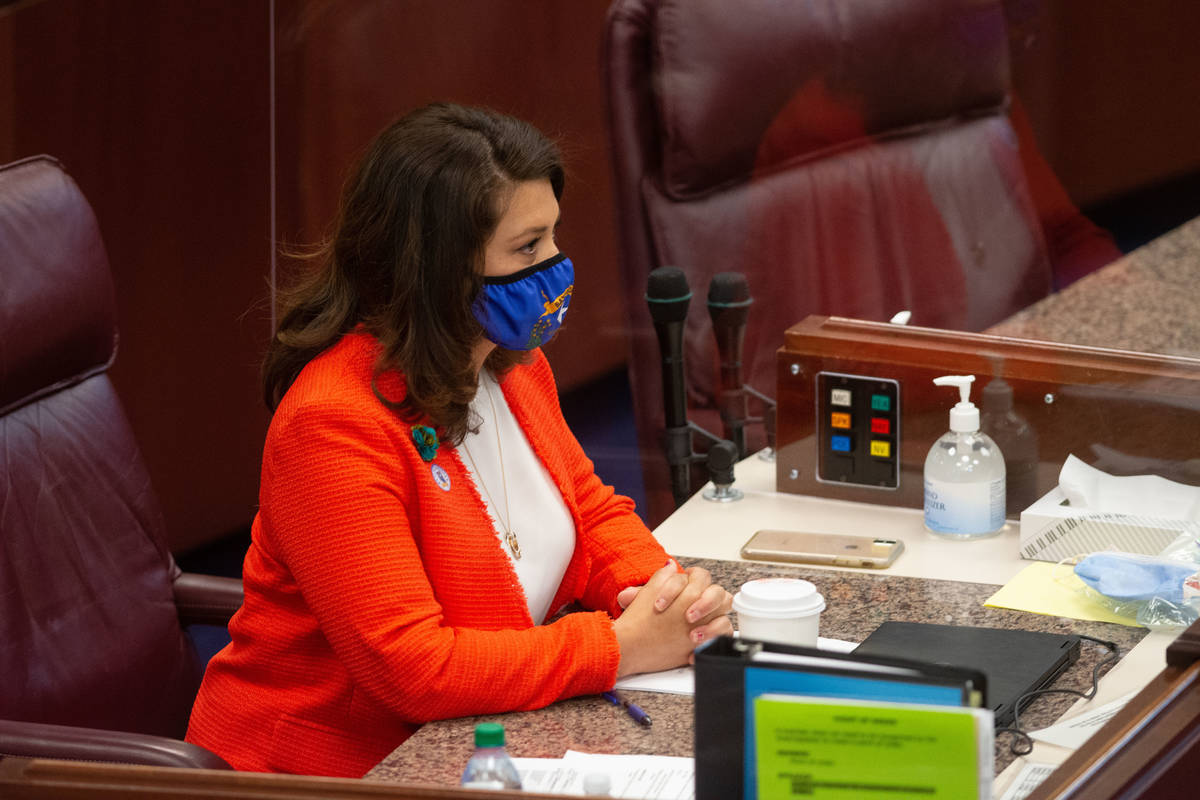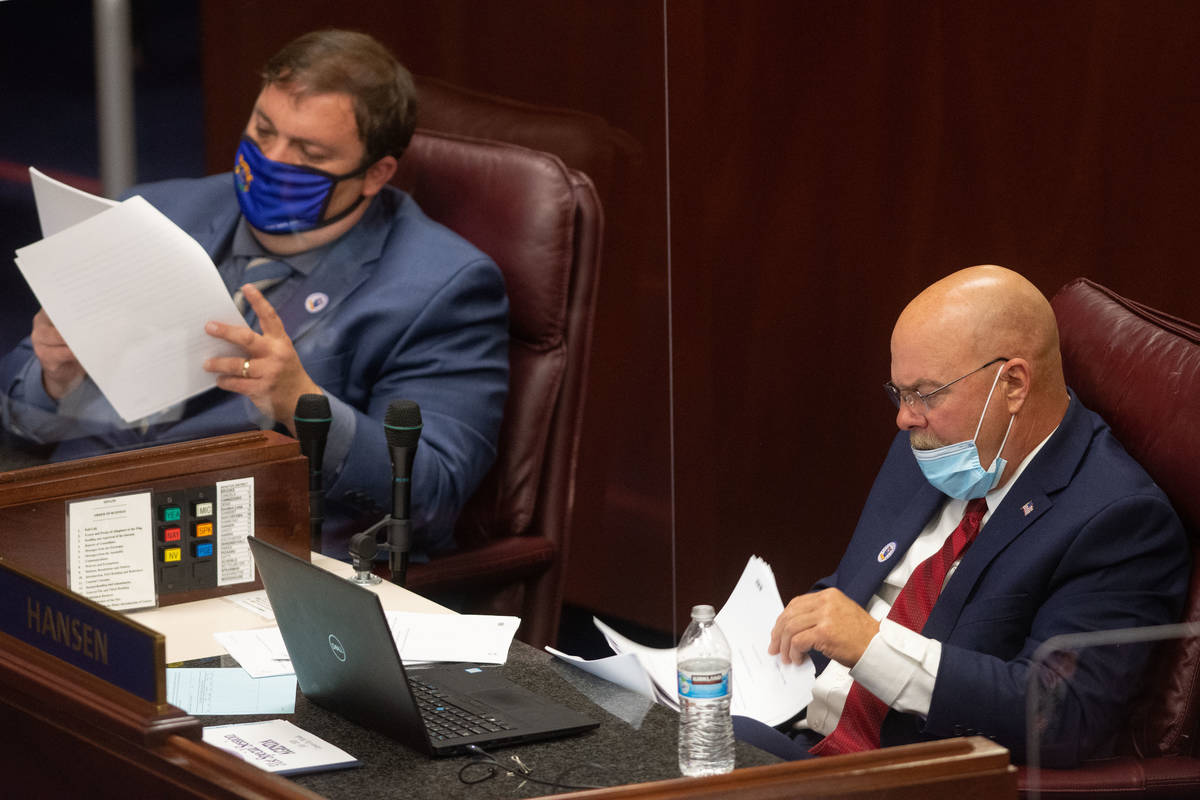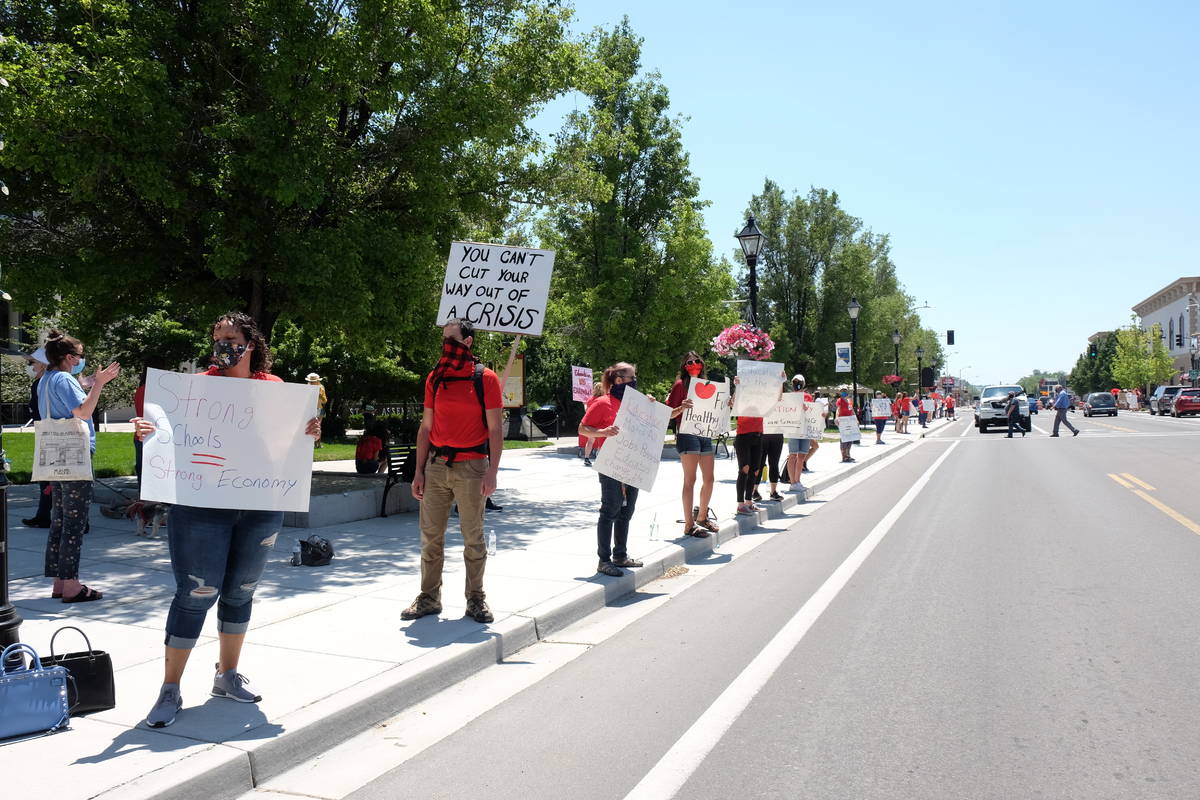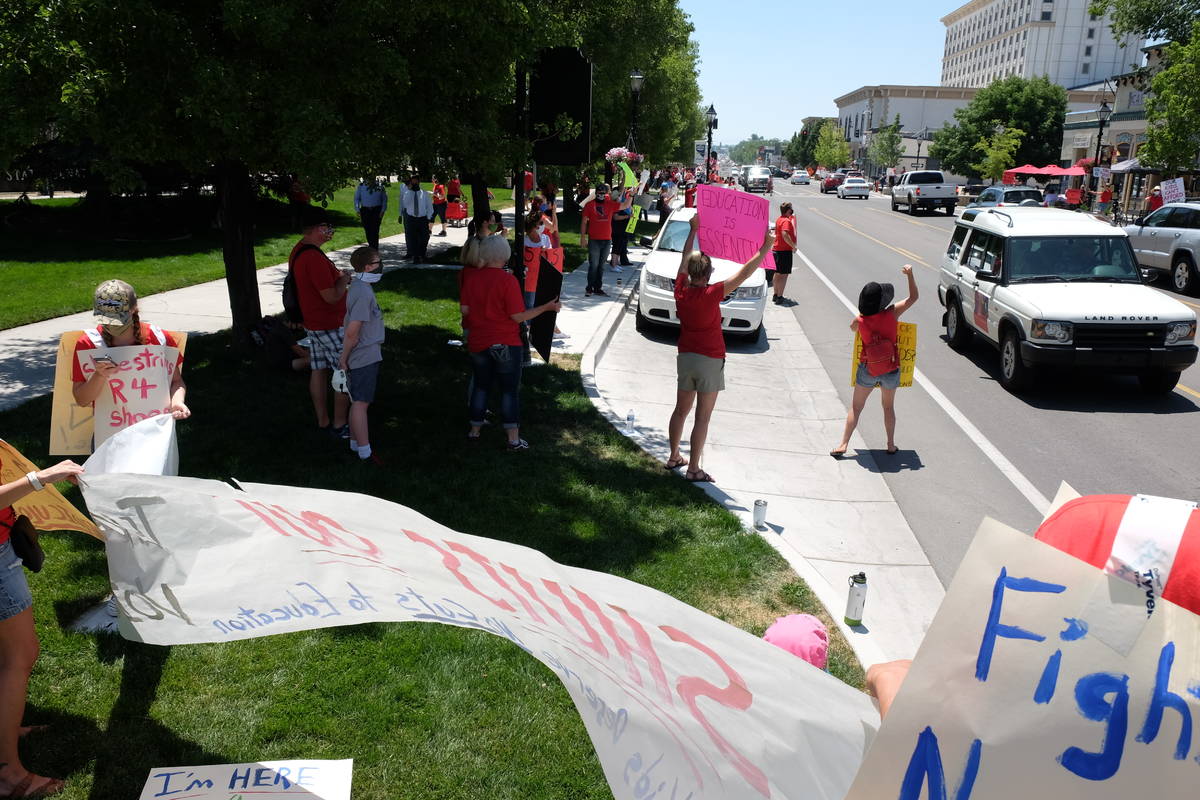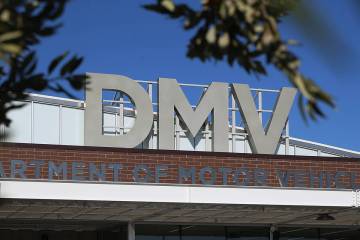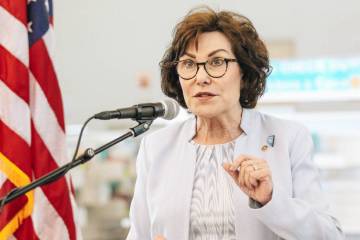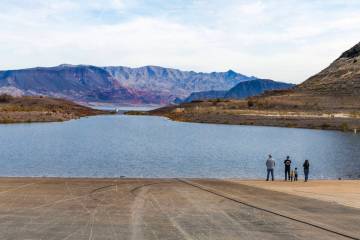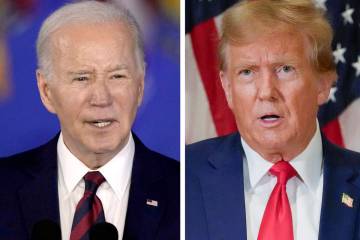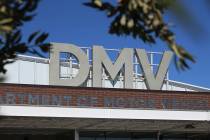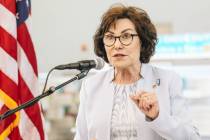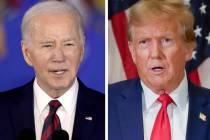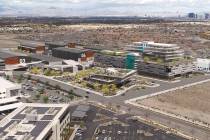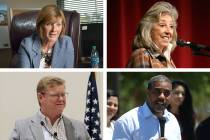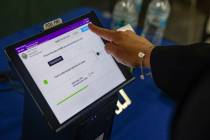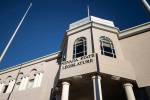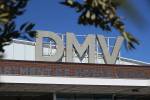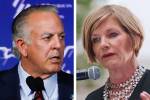Hansen, Democrats cross rhetorical swords on Senate floor — LIVE BLOG
This blog, by Review-Journal Capital Bureau reporters Colton Lochhead and Bill Dentzer, will be continually updated during the special session called to address the state’s dramatic budget shortfall caused by the coronavirus pandemic.
July 13, 6:15 p.m.
As the Senate closed a light agenda Monday and prepared to adjourn, Sen. Ira Hansen, R-Sparks, asked to be recognized to make some remarks from the floor. Hansen is known for his verbal polemics and was about to deliver one, aimed primarily at Gov. Steve Sisolak. You can watch it here.
Hansen’s broadside, he said, was on behalf of businesses dealing with statewide restrictions imposed to fight the spread of COVID-19 — a “one size fits all policy,” in his view, that prevents local officials from setting their own rules.
“People are anxious to be able to get out and participate in our economy today,” Hansen said. “And I think everybody in this room, as we look at this budget situation, I hope recognizes that there is a total 100 percent relationship between the health of our business community and the tax revenues for our state.”
He continued: “So we need to take the handcuffs off. We need to quit having a one-size-fits-all policy dictated by the governor to this state. We need to stand up as a legislative body and come up with good reasonable regulations, and allow these local communities to have a lot more say in when and when they are not going to shut down specific businesses.
“And to go out and target bars for example, just is beyond reason,” he said, a reference to Sisolak’s latest move to again close alcohol-serving establishments to fight the virus’s spread.
Hansen made some additional complaints before concluding. Then came the rebuttals.
First. Sen. Pat Spearman, D-North Las Vegas, said state restrictions weren’t an arbitrary one-size-fits-all policy but an attempt “to flatten the curve, because if we’ve been paying attention the curve is going the opposite way now.”
Then, Sen. Dallas Harris, D-Las Vegas, praised businesses “that are doing the hard job of trying to keep our communities safe…doing what we think is the right thing, and I appreciate their efforts in enforcing and taking some of the brunt for the state. It’s truly appreciated.”
But Spearman and Harris were but warm-up acts for Majority Leader Nicole Cannizzaro, D-Las Vegas, who had some passion of her own to share:
“We are faced with a set of decisions that no one in this body wanted to be here to make, and likewise that the governor did not want to have to make those decisions, either,” she said.
“But in the face of a public health crisis, it is incumbent upon us, the elected leaders of our communities, to do the hard things to make the tough decisions. And I cannot say how difficult I think it is for all of us to have sat through the last few days listening to the effects of the economic results of having to make hard public health decisions.
“We are seeing numbers in our state rise, we are seeing hospitals and beds filling up. And we are coming close to being, in this body, talking about some very difficult cuts to critical services that strike at the heart of health care, that strike at the heart of education. Those are not easy decisions to make. And so the idea that somehow we should have allowed for a public health crisis to wipe out our citizens, our loved ones, our families, our neighbors or that the governor should have made a different decision to not protect the health and welfare of Nevadans. I just am left at a loss as to what to say to that….”
“And so, I don’t like wearing a mask any more than anyone else, but I’m going to do it because it’s going to keep people safe and I think there are a number of businesses in our community who are doing what they want to do to keep people safe. Not because that’s what they decided to do, but because it’s what they have to do, and they want to keep their customers safe and they want to keep their employees safe.”
-Bill Dentzer
July 11, 5:40 p.m.
After asking for it to be included in the special legislative session, it now appears the Clark County School District wants nothing to do with a proposal that would allow it to sweep unspent carry over money from schools for the district’s own budget.
The controversial proposal, Assembly Bill 2, has drawn criticism from lawmakers, teachers, principals and education advocates alike, many of whom voiced concerns during the Saturday afternoon hearing.
Many said they worry about taking carry over money from the coffers of those schools, many of which are also facing steep proposed cuts that would slash roughly $100 million from a pair of programs aimed at helping low-achieving students make up ground.
Clark County Education Association Executive Director John Vellardita, who presented the bill as well as an amendment that the union had proposed to lawmakers, was peppered with questions for members of the Assembly asking about the bill’s intent
But Vellardita said repeatedly that he couldn’t talk about the original intent, because it wasn’t the union who brought the idea forward in the first place.
“You’ll have to ask the superintendent,” Vellardita said.
Assembly Speaker Jason Frierson paused the questions briefly to clarify to lawmakers that it was the school district that requested the bill before it was included in Gov. Steve Sisolak’s special-session proclamation. (In a special session called by the governor in Nevada, the Legislature can only conduct the business reflected in the governor’s proclamation.)
Earlier in the week, Clark County School District Superintendent Jesus Jara appeared to back away from the proposal, telling lawmakers in initial presentations on the budget cuts that his intention was to keep the money at the school level.
After the near-hour long period of public testimony on the bill ended, it appeared that lawmakers would not hear from the district or Jara on the issue Saturday. But after the hearing, Jara called in during the public comment period, telling lawmakers he wanted to set the record straight.
Jara said he spoke with Frierson on Tuesday, the day before the session started, and told him “that I do not want this bill to move forward.” Jara began to lay out a timeline of those communications with Frierson and the governor’s office, but Frierson cut him off after two minutes — the amount of time allowed per speaker in public comment.
Afterward, Frierson chided Jara for responding “in a public comment forum as opposed to taking responsibility,” and said that Jara tried to pull the bill just hours before Sisolak’s proclamation went out Tuesday, when it was too late to change the document.
“I want to make it abundantly clear that AB2 was exclusively the request of CCSD to be placed on the agenda. And that request was withdrawn two hours before the actual proclamation was issued,” Frierson said.
“You don’t get to light a firecracker and run just before it goes off,” he added.
-Colton Lochhead
July 11, 3:50 p.m.
The one person involved in the special session who has tested positive for COVID-19 has remained anonymous, as is customary for people who get the diagnosis. But a remark made as the Senate moved to adjourn Saturday suggested that the person is associated with the Assembly.
Senators were calling it a day a little before 4 p.m. after about two hours of questions and public comment on Senate Bill 3, which would temporarily accelerate tax collections on net proceeds of minerals mined in the state and move money from a dedicated highway fund to the state’s main budget account.
As they prepared to adjourn, Republican Minority Leader James Settelmeyer of Minden rose to thank the building’s cleaning crew for their extra work “to clean and disinfect this place” to guard against the potential spread of COVID-19. In doing so, he referenced events that have happened “the last couple of days within the body…or more appropriately the other body.”
The Senate had met Friday more or less as usual. The Assembly, however, had delayed convening for more than six hours. When they did, they promptly adjourned.
After praising the maintenance and cleaning crew, Settelmeyer suggested the session “ought to take a break for a couple of days, allow staff to catch up.”
And he didn’t mean just the cleaning staff.
“There’s so much information we’ve asked of the executive department that has not been provided to us that our staff still needs in order to make the right decisions,” Settelmeyer said. “I think we ought to take break for several days in order to let this go through, let us all get retested, make sure we keep you safe, get it done that way. That’s just my personal opinion, because we need that time, and we need that safety.”
No one rose to say more and the Senate adjourned until Monday.
As of Friday, the person who is COVID-19 positive was reported to be asymptomatic and “feeling well.”
A bit later in the afternoon, the Assembly also adjourned until Monday, meaning there will be no special session activity on Sunday.
— Bill Dentzer
July 11, 3:30 p.m.
The state Assembly started working on one of the major budget bills Saturday, Assembly Bill 1. That bill would implement the proposed mandated 12 furlough days and merit pay freezes for 18,000 state workers.
The move would save about $52 million for the state, which is facing a projected shortfall of $1.2 billion in the next fiscal year.
The proposal was met with significant backlash from state workers, who noted that most had to endure similar furloughs and pay freezes for several years during the Great Recession, and only recently had their pay unfrozen.
Cedric Williams, a chapter president for the American Federation of State, County and Municipal Employees in Carson City, said that many of his fellow state workers are already struggling financially.
“At this point in time, I’m dealing with my brothers and sisters who cannot afford to put food on the table, clothes on the backs of their children or even send them to college. And now there’s more budget cuts being proposed once again,” Williams said.
The furlough days would equate to a pay cut for workers of about 4.6 percent.
Some lawmakers proposed having the state’s more highly paid workers take more than one furlough day a month, possibly as much as three, in an attempt to save those furlough days.
“I just see a lot of programs that are dispassionately affecting low-income families. And if we can find some way to lighten it would be extremely helpful for those folks the lower incomes,” said Assemblywoman Heidi Swank, D-Las Vegas.
Assemblywoman Danielle Monroe-Moreno, D-North Las Vegas, echoed those comments, adding that the furloughs would have a “greater impact on the income coming into their home,” and said they could have to use some of the services that the state is considering cutting.
Laura Freed, director of the Department of Administration, noted that roughly 10,800 state workers earn less than $60,000 per year, while 1,602 earn more than $90,000.
No vote was taken on the bill.
— Colton Lochhead
July 11, 1:30 p.m.
After a COVID-19 scare delayed the Assembly from conducting any real business publicly Friday, 12 members of the body are taking part remotely.
The Assembly and Senate each passed new rules on the first day of the special session allowing members in each body to participate remotely, a precaution put in place so that the Legislature could continue working in case someone were to be quarantined or test positive.
Legislative Counsel Bureau Director Brenda Erdoes announced Friday that a person who had been in the building tested positive. That person was not symptomatic, and was feeling well according to Erdoes, but their name or where they worked in the building was not released.
In the Senate, Sen. Pat Spearman, D-North Las Vegas, was also participating remotely.
The members of the Assembly who chose to participate electronically were:
Shea Backus
Teresa Benitez-Thompson
Shannon Bilbray Axelrod
Richard Carrillo
Kasina Boone
Brittney Miller
Danielle Monroe-Moreno
Heidi Swank
Heidi Swank
Ozzie Fumo
Ellen Spiegel
Jill Tolles
The Assembly is taking up two bills today: Assembly Bill 1, which implements the 12 furlough days per year for state and higher education workers, and Assembly Bill 2, which would allow the Clark County School District to sweep unspent money from the school budgets and use it for for district’s own budget.
The Senate is taking up Senate Bill 3, which would allow mining companies to prepay their taxes for FY 2021.
-Colton Lochhead
July 10, 10:30 a.m.
Everyone wants to talk about raising taxes, but no one seems to be actually talking about tax increases through the first two days of Nevada’s special session to address the budget deficit.
Gov. Steve Sisolak reiterated his stance that any proposals to raise tax revenues to mitigate part of the state’s $1.2 billion budget deficits would be up to the Legislature to propose and pass.
But thus far, those talks have gone nowhere.
In order for any tax increase to pass, at least one Republican senator would need to be on board along with all of the Democratic senators.
Assembly Speaker Jason Frierson said that he hasn’t had any substantive talks with Republican leadership about raising revenues.
Asked why those conversations haven’t taken place yet, Frierson said, “that would be a question with those folks,” seemingly referencing Republicans in the Senate.
Reno Republican Sen. Ben Kieckhefer said earlier Thursday that “I haven’t had any talks about a tax increase.”
Frierson added that he spoke to GOP leaders in both chambers, telling them that “we need to start having these conversations in greater detail.”
-Colton Lochhead
July 9, 3:00 p.m.
With wildfires raging across Nevada and the West, losing wildland firefighters due to budget cuts could have been devastating for Nevada.
And based on the initial proposed $1.2 billion in cuts to Nevada’s budgets, that looked to be the case for the state.
The governor’s finance office on Wednesday laid out more detail on how deep the $1.2 billion budget cuts to offset lost revenues will go. Those cuts include about $524,000 to state funding for the Nevada Division of Forestry’s budget which would have included eliminating 11 seasonal firefighting positions.
But thanks to federal grant monies, the state will be able to fill those positions, State Forester Kacey KC said Thursday.
“Those positions are very critical,” KC said.
Ten of the 11 seasonal positions will be funded by grant monies from the U.S. Forest Service. The last position will be filled by a current forestry staffer, she added.
That’s good news for the state whose outlook for the current fire season has shifted for the worse in recent months. A heavy winter snow season two years ago, followed by a lack of major precipitation in the most recent winter means Nevada is likely in store for a “well above average” fire season in 2020 by predictive models, KC said.
As of Thursday morning, roughly 102,000 acres had burned in Nevada across 307 fires, 262 of which have been caused by people. Last year, which was considered a very low fire season, some 82,000 acres burned
In just the last two weeks, the state has seen large, fast-growing fires on Mount Charleston just outside of Las Vegas, on Peavine Peak just above Reno, and most recently the Numbers Fire which has threatened the town of Gardnerville, some 30 minutes south of Carson City.
Without the federal grant funds, those cuts would have meant Nevada would lose at least two days of staffing for one of its three helicopter crews, which KC said have been even more critical this year as they have relied more heavily on aerial fire suppression with concerns over the spread of the coronavirus.
“We couldn’t lose the capacity this year,” KC said.
-Colton Lochhead
July 9, 10:45 a.m.
The Assembly introduced a pair of bills on the second day of Nevada’s special session.
Assembly Bill 1 will implement the freeze to merit pay increases and mandatory 12 furlough days for state workers for fiscal year 2021.
Assembly Bill 2 would allow for the Clark County School District to access unspent carry-over funds that some schools have to augment the district’s own budget.
The proposal was specified in Gov. Steve Sisolak’s proclamation for the special session. But when asked about the proposal by lawmakers Wednesday, Clark County School District Superintendent Jesus Jara said that “the funding would remain at the school level,” and it remains unclear how that money would be used if the bill were to pass.
-Colton Lochhead
July 9, 9:00 a.m.
While Gov. Steve Sisolak has left the door open to potential tax increases to help offset the steep budget cuts the state is facing, he said Wednesday that any decision on that would be up to lawmakers.
So far, Democratic leaders who control both chambers have offered little indication if they intend to pursue tax increases, or where those additional revenues would come from.
“We’re still having a lot of ongoing discussions,” said Senate Majority Leader Nicole Cannizzaro, D-Las Vegas, during a press conference late Wednesday night after the Legislature went into recess.
A tax increase could pass in the Assembly without any Republican votes. But in the state Senate, at least one Republican would need to be on board in order to meet the two-thirds vote requirement.
“It has to be a bipartisan solution. We welcome the idea to talk about any of those solutions,” Cannizzaro said.
Cannizzaro was also asked about potential policy changes that could come in a subsequent special session that’s expected to quickly follow the current session that is focused primarily on addressing the budget hole.
Specifically talking about police reform, she said revisiting Senate Bill 242 from the 2019 session that has come under the microscope in the wake of the death of George Floyd who died while in Minneapolis police custody is something that is “certainly part of the discussion.”
Criminal justice reform advocates have in recent months targeted the bill - which is sometimes referred to as the “police officers’ bill of rights” - saying that it only made it more difficult to hold police accountable.
The bill was sponsored by Cannizzaro, who works as a prosecutor in the Clark County district attorney’s office
“The bill was an affront to Black, brown and other communities that have suffered abusive policing,” a trio of civil rights and reform advocates wrote last month.
“I don’t think there was ever any intention by this Legislature, certainly not by myself, to create a situation where we cannot hold police officers accountable,” Cannizzaro said.
Cannizzaro said that a lot of what was in that bill came from the notion that workers should be “treated fairly in the workplace.”
“That said, we also know that we have to do better. We have to do more to make sure people can have faith in the community that protects then and also to hold people responsible for their lack of accountability.”
-Colton Lochhead
July 8, 12:15 p.m.
Because of COVID-19 concerns, the Legislature’s special session was closed to the general public, with primarily lawmakers and essential staff allowed inside the building. The rules made providing for public participation in the process a challenge, with public comments at hearings permitted only via teleconference.
Outside the legislative building, however, state workers and supporters of education lined Carson Street to protest state budget cuts that could affect them. It was as close as they could get to the building to have their voices heard, and some called in from the sidewalk to give public comment during the morning Assembly session.
“I’m actually just outside the Legislature with hundreds of educators who have come to Carson City to make sure that their voices are heard,” the Nevada State Education Association’s Chris Daly told lawmakers. “Nobody envies the position that you’re in looking at $1.2. billion in cuts. The truth is you it can’t get out of this economic disaster, by cutting alone.”
Daly and other education advocates want lawmakers to much budget cuts dollar for dollar with new revenue.
“It’s not going to be easy to do, but nothing now is easy to do,” he said.
-Bill Dentzer
July 8, 11:45 a.m.
Nevada’s special legislative session got off to a bit of a delayed start Wednesday — as they often do — but by 10 a.m. things were rolling as the Assembly and Senate adopted rules to speed up the process and to take the potential of COVID-19 spread into account.
It didn’t take long for the first disagreement to crop up, with Republican lawmakers voicing their concern with a rule change that allow lawmakers to vote remotely, in case they are quarantined due to COVID-19.
Senate Minority Leader James Settelmeyer, R, Minden, said people voting remotely could be outside the state, or even the country, creating “a problem of accountability and transparency.”
Through other crises, lawmakers “always had the ability to meet in Carson City. Even now, we’re still under rules and protocols (for) safety and have all done everything we can from wearing masks to getting tested to make sure to alleviate these concerns. I think this is improper to violate the constitution and will be voting against it.”
(Under Article 4, Section 1 of the Nevada Constitution, “…the sessions of such Legislature shall be held at the seat of government of the State. Article 15, Section 1 of the constitution identifies that seat as Carson City.)
The vote passed on party lines in the Senate. A similar resolution to change the rules passed in the Assembly on a voice vote, with some Republican lawmakers voting against it.
Both chambers voted to suspend rules that require bills to be read three times before they can be voted as a way to speed up the process. Both chambers are slated to hear overviews on Gov. Steve Sisolak’s proposed budget cuts to state agencies, K-12 education and to the Nevada System of Higher Education. Sisolak’s plan calls for cuts of $550 million to state agency budgets, about $160 million to K-12 education, and $190 million to higher education.
-Colton Lochhead



